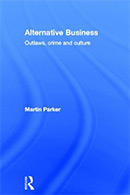Alternative Business: Outlaws, Crime and Culture

Author: Martin Parker
New York: Routledge, 2011. 192p.
Reviewer: David A. Marvelli | May 2012
The nineteenth century philosopher Friedrich Nietzsche warned if you stared into the abyss too long, the abyss eventually gazes into you. In Alternative Business, Martin Parker delves into the abyss of Western culture and finds a subversive counter-culture message permeating stories of infamous cultural icons from Robin Hood to Captain Jack Sparrow. He uses popular tales of pirates, westerners (in the United States), highwaymen, and the mafia to demonstrate how these popular stories throughout history have presented an alternative form of social order and economy. Given these stories broad appeal with audiences of different eras, Parker suggests the popularity of these stories over time underscores society’s continued dissatisfaction with its own social organization and political economy.
Utilizing a variety of sources to include historical documents, history books, Hollywood films, TV cartoon shows, romantic poems, and academic texts, Parker dissects popular stories of cultural icons to demonstrate how the common story romanticizes individuals who have opposed the political and economic power of the time. This message, according to Parker, is formulated through a “cultural script” which consists of turning an otherwise infamous criminal into an outlaw, who has been the victim of an injustice perpetrated by the powerful; and who must resort to justified or excused violence when an explosive incident of some kind occurs. These combined elements—or structural characteristics—provide the parameters for the portrayal of the outlaw as a chivalrous hero. To demonstrate this framework, Parker provides an in-depth review of the history and evolution of the story of Robin Hood, demonstrating how facts and fiction were often intertwined to develop the myth of a noble born outlaw who steals from the rich to give to the poor.
In understanding the relationship between society and the outlaw, Parker suggests the notion of “outside-ness” becomes critical because it places the offender “outside” of mainstream society, both literally and figuratively. As with Robin Hood and his merry men, the bandits do not follow the normative rules of society; they create an alternative “utopian” society for themselves in the forests of Sherwood. Likewise, the pirates of the eighteenth century were able to form a more democratic society for themselves on the high seas—physically removed from their colonial rulers. Yet with the periods of industrialization and urbanization, the outlaw-hero came to be viewed as an urban criminal living among us. With this transformation, according to Parker, the magnetism of the individual outlaw began to wane in favor of the group. The group—which came to be viewed as “organized crime” or an “underworld”—provided the services and goods the “upperworld” demands, but the powerful proscribe.
Despite Parker’s rather loose methodology for comparing different texts and drawing interpretative meaning from them—limitations he acknowledges—Alternative Business is a thought-provoking indictment of the interrelationship among outlaws, crime, and culture. Society’s interest in and the appeal of stories of Robin Hood, Blackbeard, Bonnie and Clyde, and the mafia may indeed underscore the desires (or mere fantasies) of some to break the rules and rebel against the established order.
David A. Marvelli is a Ph.D. candidate at Rutgers University and an intelligence analyst for the Federal Bureau of Investigation
The views and opinions expressed herein are those of the author and do not necessarily reflect the views of the Federal Bureau of Investigation.


